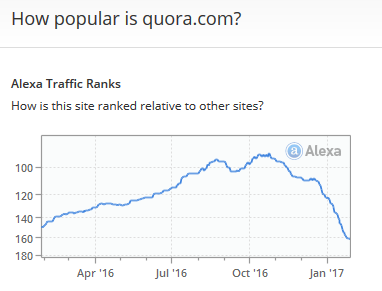https://www.quora.com/What-did-M…
Nicholas:
I’ll reiterate what I said under your cited answer here. It’s a truism that all online communities run out of steam. Including this one. Despite how much the UX does or doesn’t innovate.
When the company goes to war with its users as often as Quora does, that might limit the community’s shelf life whatever twiddling to the UX they do. But you’re betting on more new writers coming in than old ones flaming out, and so far, it’s worked.
Your answer claimed that Quora will do better than Wikipedia, because Quora keeps innovating in its UX. (Some of us naysayers have more colourful ways of describing what Quora keeps doing to its UX.) Well, Wikipedia predates Quora by a decade. Let’s talk about Quora in a decade, Marc.
Bodnick:
Seems like there is a handsome opportunity to create value. Want to make a wager?
Nicholas:
You’re on. 100 USD, 2027–08–09, that Quora will have less Alexa share then than now.
I will likely not be on Quora by then, but I am betting that Google still will, so: opoudjis at Gmail
Bet’s off if Quora is acquired. I win if Quora no longer exists. And I’ll pay up if I’m wrong.
Bodnick:
I’m in.
Nicholas:
I’m forwarding this exchange to The Insurgency, because I want witnesses.
EDIT: Current Alexa ranking of Quora: #112.

